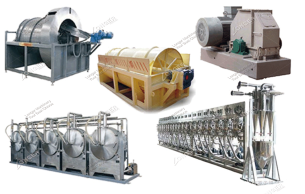Starch is the most common carbohydrate in the human diet and is contained in many staple foods. The major sources of starch intake worldwide are the cereals (rice, wheat, and maize) and the root vegetables (potatoes and cassava). Many other starchy foods are grown, some only in specific climates, including acorns, arrowroot, arracacha, bananas, barley, breadfruit, and yams, and many kinds of beans, such as favas, lentils, mung beans, peas, and chickpeas.

Widely used prepared foods containing starch are bread, pancakes, cereals, noodles, pasta, porridge and tortilla.
Digestive enzymes have problems digesting crystalline structures. Raw starch will digest poorly in the duodenum and small intestine, while bacterial degradation will take place mainly in the colon. When starch is cooked, the digestibility is increased.
Starch gelatinization during cake baking can be impaired by sugar competing for water, preventing gelatinization and improving texture.
Historically, people consumed large amounts of uncooked and unprocessed starch-containing plants, which contained high amounts of resistant starch. Microbes within the large intestine fermented the starch, produced short-chain fatty acids, which were used as energy as well as maintenance and growth of the microbes. As foods became more processed, they were more easily digested and released more glucose in the small intestine - less starch reached the large intestine and more energy was absorbed by the human body. This shift in energy delivery may be one of the contributing factors to the development of metabolic disorders of modern life, including obesity and diabetes
The starch industry extracts and refines starches from seeds, roots and tubers, by wet grinding, washing, sieving and drying. Today, the main commercial refined starches are cornstarch, tapioca, wheat, rice and potato starch. To a lesser extent, sources include rice, sweet potato, sago and mung bean. Historically, Florida arrowroot was also commercialized. To this day, starch is extracted from more than 50 types of plants.
Untreated starch requires heat to thicken or gelatinize. When a starch is precooked, it can then be used to thicken instantly in cold water. This is referred to as a pregelatinized starch.
Longer’s
starch production line is module structure design, installation in a stainless steel base, the installation is very convenient. Overall design of the cyclone tubes, all stainless steel materials, long service life, high separation efficiency. Meet national health standards;Internal easy cleaning.Optional intelligent control system, auto-off isolated from the gravel.
